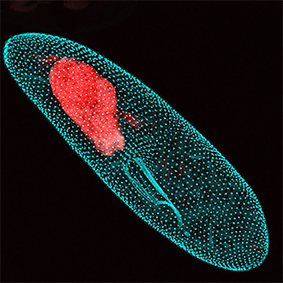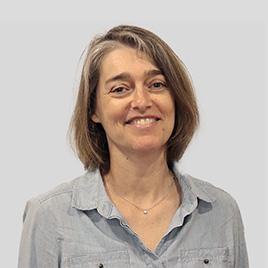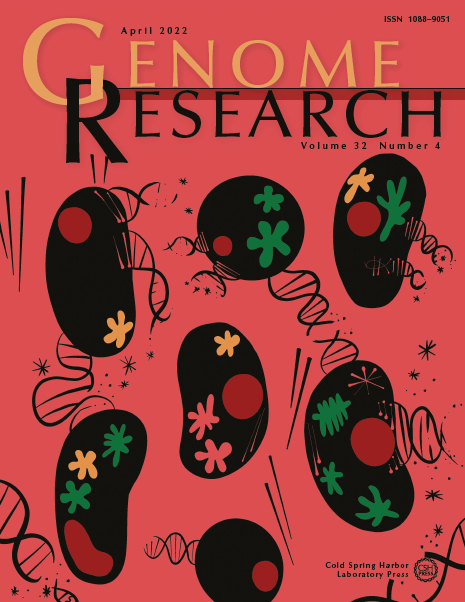Programmed Genome Elimination
Sandra DUHARCOURT
Our work aims to understand the fundamental mechanisms governing chromosome structure and genetic stability in eukaryotes. We study a remarkable process of genome editing that occurs during development in the unicellular eukaryote Paramecium.
Keywords: epigenetics, transposable elements, non-coding RNA, chromatin, Polycomb, genome evolution, Paramecium
+33 (0)1 57 27 80 09 Contact @sandraduharcourt.bsky.social
In Paramecium, at least one third of the germline genome is eliminated during development. This process involves the massive and reproducible elimination of repeated DNA sequences, such as transposable elements, and of 45,000 short non-coding sequences, scattered in the genome, relics of transposable elements. No conserved sequence motif that might serve as a specific recognition signal was identified among eliminated sequences. Understanding how such diverse sequences are recognized and excised remains challenging.
Current research aims to i) identify the eliminated sequences and describe their evolutionary trajectory, ii) elucidate the molecular mechanisms of programmed DNA elimination and iii) understand the possible functions associated with this massive genome reorganization.
The process involves small (s)RNA-directed heterochromatin formation and subsequent DNA excision and repair. sRNAs are produced from the germline genome during meiosis and guide the deposition of histone H3 post-translational epigenetic modifications (H3K9me3 and H3K27me3) onto sequences to be eliminated in the developing somatic nucleus, and specifically tether the DNA cleavage and repair machinery.
We demonstrated that the Paramecium histone methyltransferase Ezl1, a homolog of the mammalian PRC2 catalytic subunit, catalyzes H3K27me3 and H3K9me3 on TEs. We currently investigate how the Ezl1-associated complex is recruited to TEs, and how the histone H3 post-translational modifications trigger DNA cleavage and repair. We combine a large panel of molecular, cellular, high throughput sequencing, genetic and biochemical approaches to study the role of chromatin factors in the epigenetic control of DNA elimination.
Using an innovative flow cytometry approach to purify nuclei, we sequenced the genomes of nine Paramecium species for comparative genomics. These resources will allow us to elucidate the structure of Paramecium chromosomes, the evolutionary trajectories of eliminated sequences and their mechanisms of recognition and elimination.
Members
 Louise ABBOU, Biology engineer, DUHARCOURT LAB+33 (0)1 57 27 80 00, room 554B
Louise ABBOU, Biology engineer, DUHARCOURT LAB+33 (0)1 57 27 80 00, room 554B Gaelle ALLEON, PhD student, DUHARCOURT LAB33 (0)1 57 27 80 00, room 554B
Gaelle ALLEON, PhD student, DUHARCOURT LAB33 (0)1 57 27 80 00, room 554B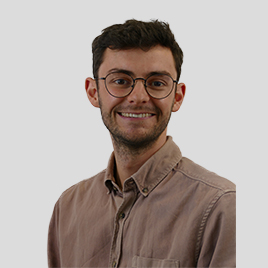 Thomas BALAN, PhD student, DUHARCOURT LAB+33 (0)1 57 27 80 00, room 554B
Thomas BALAN, PhD student, DUHARCOURT LAB+33 (0)1 57 27 80 00, room 554B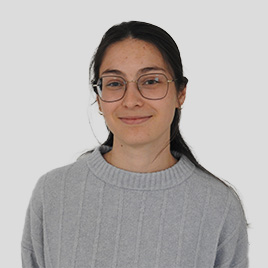 Marina GIOVANNETTI, PhD student, DUHARCOURT LAB+33 (0)1 57 27 80 00, room 554B
Marina GIOVANNETTI, PhD student, DUHARCOURT LAB+33 (0)1 57 27 80 00, room 554B Leticia KOCH LERNER, Assistant Professor, DUHARCOURT LAB+33 (0)1 57 27 80 00, room 554B
Leticia KOCH LERNER, Assistant Professor, DUHARCOURT LAB+33 (0)1 57 27 80 00, room 554B Julien RICHARD ALBERT, Postdoctoral researcher, DUHARCOURT LAB+33 (0)1 57 27 80 00, room 554B
Julien RICHARD ALBERT, Postdoctoral researcher, DUHARCOURT LAB+33 (0)1 57 27 80 00, room 554B Sallyann ROUGIER, Intern, DUHARCOURT LAB
Sallyann ROUGIER, Intern, DUHARCOURT LAB
To contact a member of the team by e-mail: name.surname@ijm.fr
- Duharcourt S. Programmed ‘DNA splicing’ removes transposons from genes. Nat Rev Mol Cell Biol. 2026 Jan 5. doi: 10.1038/s41580-025-00943-z. Epub ahead of print. PMID: 41491422.
Arnaiz O, Guérin F, Couloux A, Miró-Pina C, Pellerin G, Nekrasova I, Amselem J, Aury JM, Bhullar S, Frapporti A, Lerat E, Luyten I, Malinsky S, Mathy N, Potekhin A, Régnier V, Sawka-Gądek N, Touzeau A, de Vanssay A, Zangarelli C, Quesneville H, Bétermier M, Labadie K, Duret L, Meyer E*, Duharcourt S*, Sperling L*. The tiny germline chromosomes of Paramecium aurelia have an exceptionally high recombination rate and are capped by a new class of Helitrons. BioRxiv. https://doi.org/10.1101/2025.11.06.686955
Balan, T.#, Bazin-Gélis, M.#, Guérineau, M.#, Vitali, V.#, Zangarelli, C., Arnaiz, O., Abbou, L., Altair, A., Jonchay, A. B. du, Camprodon, A., Giovannetti, M., Poitrenaud, C., Schumacher, E., Bischerour, J., Tassin, A.-M., Régnier, V., Chevreux, G., Duharcourt, S.*, Bétermier, M. *. (2025). A developmental condensin I complex assists the Paramecium PiggyMac domesticated transposase during programmed DNA elimination. bioRxiv. https://doi.org/10.1101/2025.10.03.680307
- Miró-Pina C, Charmant O, Giovannetti M, de Vanssay A, Frapporti A, Humbert A, Lhuillier-Akakpo M, Chevreux G, Arnaiz O, Duharcourt S. A histone methyltransferase-independent function of PRC2 controls small RNA dynamics during programmed DNA elimination in Paramecium. Nucleic Acids Res. 2025 Oct 14;53(19):gkaf1048. doi: 10.1093/nar/gkaf1048. PMID: 41099712; PMCID: PMC12529928.
- Olivia Charmant, Julita Gruchota, Olivier Arnaiz, Katarzyna P Nowak, Nicolas Moisan
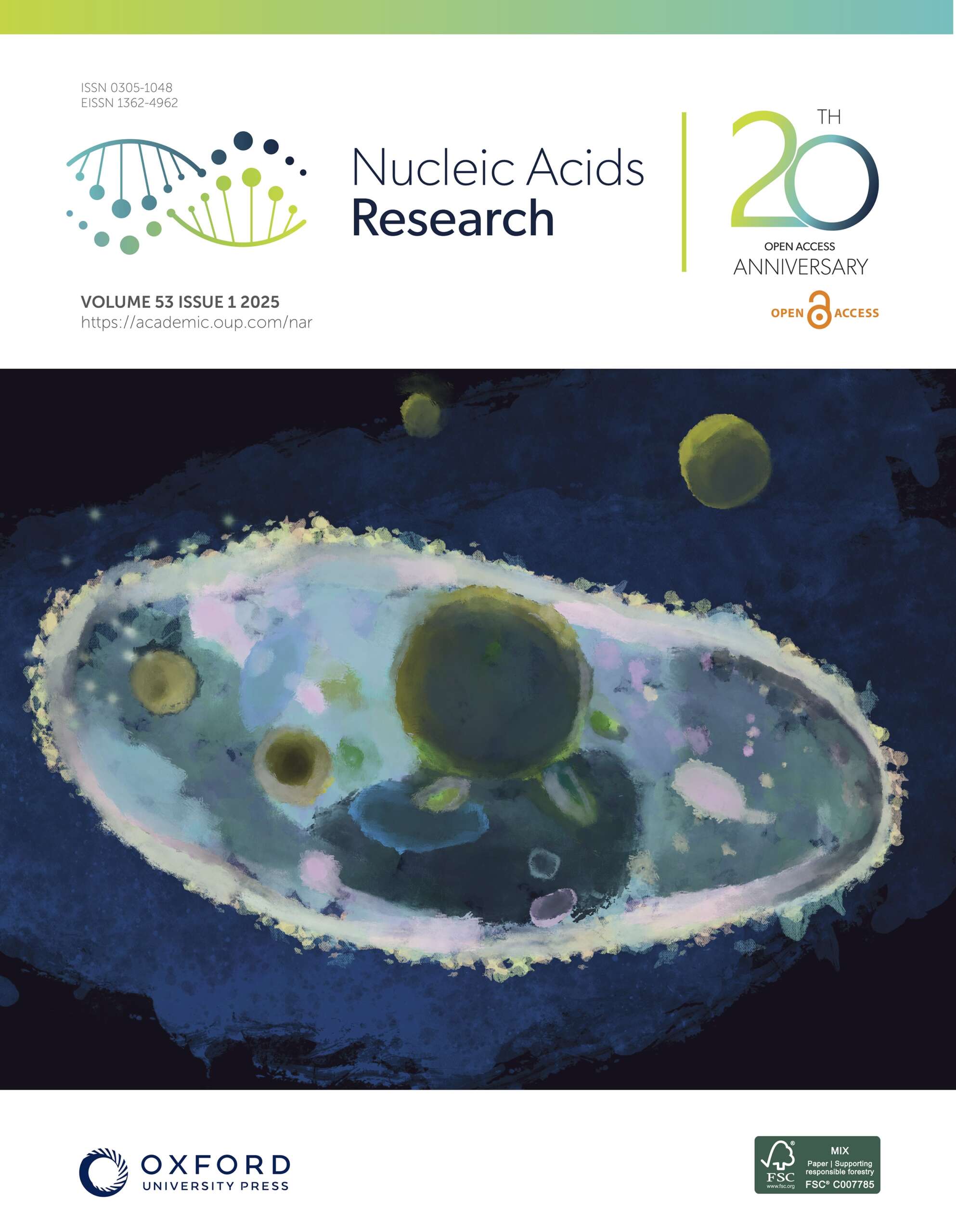 , Coralie Zangarelli, Mireille Bétermier, Anna Anielska-Mazur, Véronique Legros, Guillaume Chevreux, Jacek K Nowak, Sandra Duharcourt, The PIWI-interacting protein Gtsf1 controls the selective degradation of small RNAs in Paramecium, Nucleic Acids Research, 2024; https://doi.org/10.1093/nar/gkae1055
, Coralie Zangarelli, Mireille Bétermier, Anna Anielska-Mazur, Véronique Legros, Guillaume Chevreux, Jacek K Nowak, Sandra Duharcourt, The PIWI-interacting protein Gtsf1 controls the selective degradation of small RNAs in Paramecium, Nucleic Acids Research, 2024; https://doi.org/10.1093/nar/gkae1055
- Miró-Pina C, Charmant O, Kawaguchi T, Holoch D, Michaud A, Cohen I, Humbert A, Jaszczyszyn Y, Chevreux G, Del Maestro L, Ait-Si-Ali S, Arnaiz O, Margueron R, Duharcourt S. (2022) Paramecium Polycomb Repressive Complex 2 physically interacts with the small RNA binding PIWI protein to repress transposable elements.
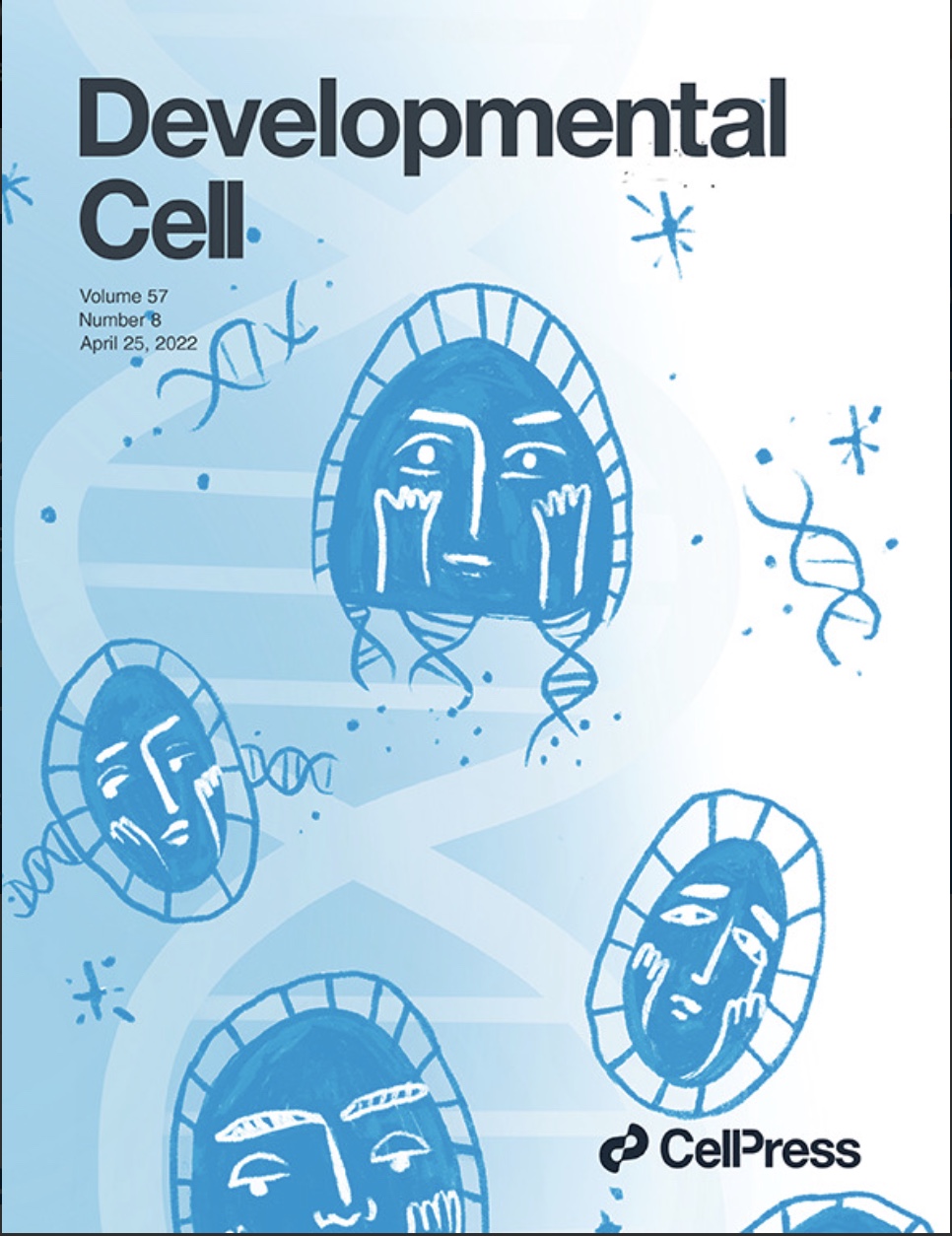 Dev Cell. 2022 Apr 6;S1534-5807(22)00208-8. doi: 10.1016/j.devcel.2022.03.014. PMID: 35429435
Dev Cell. 2022 Apr 6;S1534-5807(22)00208-8. doi: 10.1016/j.devcel.2022.03.014. PMID: 35429435 - Gnan S#, Matelot M#, Weiman M, Arnaiz O, Guérin F, Sperling L, Bétermier M, Thermes C, Chen CL*, Duharcourt S*. (2022) GC content but not nucleosome positioning directly contributes to intron-splicing efficiency in Paramecium. Genome Res. 2022 Mar 9;gr.276125.121. doi: 10.1101/gr.276125.121. PMID: 35264448
- Déléris A, Berger F, Duharcourt S*. (2021). Role of Polycomb in the control of transposable elements. Trends Genet. 2021 Oct;37(10):882-889. doi: 10.1016/j.tig.2021.06.003. PMID: 34210514 Review.
- Sellis S#, Guérin F#, Arnaiz O, Pett W, Lerat E, Boggetto N, Krenek S, Berendonk T, Couloux A, Aury J-M, Labadie K, Malinsky S, Bhullar S, Meyer E, Sperling L, Duret L*, Duharcourt S*. (2021). Massive colonization of protein-coding exons by selfish genetic elements in Paramecium germline genomes. PLoS Biol 19(7): e3001309. https://doi.org/10.1371/journal.pbio.3001309 PMID: 34324490
- https://insb.cnrs.fr/fr/cnrsinfo/invasion-massive-delements-genetiques-egoistes-dans-les-genes-de-paramecie
- Primer: Feng Y, Landweber LF (2021) Transposon debris in ciliate genomes. PLoS Biol 19(8): e3001354. https://doi.org/10.1371/journal.pbio.3001354
- Vanssay A#, Touzeau A#, Arnaiz O, Frapporti A, Phipps J, Duharcourt S. (2020). The Paramecium histone chaperone Spt16-1 is required for Pgm endonuclease function in programmed genome rearrangements. PLoS Genet. 2020 Jul 23;16(7):e1008949. doi: 10.1371/journal.pgen.1008949. PMID: 32702045
- Frapporti A#, Miró-Pina C#, Arnaiz O, Holoch D, Kawaguchi T, Humbert A, Eleftheriou E, Lombard B, Loew D, Sperling L, Guitot K, Margueron R, Duharcourt S. (2019). The Polycomb protein Ezl1 mediates H3K9 and H3K27 methylation to repress transposable elements in Paramecium. Nat Commun. 2019 Jun 20;10(1):2710. doi: 10.1038/s41467-019-10648-5. PMID: 31221974
Publication
Preprint
Gaëlle Alléon 2025 – fellowships from Université Paris Cité (ED BioSPC)
- Marina Giovannetti 2024 – fellowship from Université Paris Cité (ED BioSPC)
- Thomas Balan 2021-2025 – fellowships from Université Paris Cité (ED BioSPC), FRM
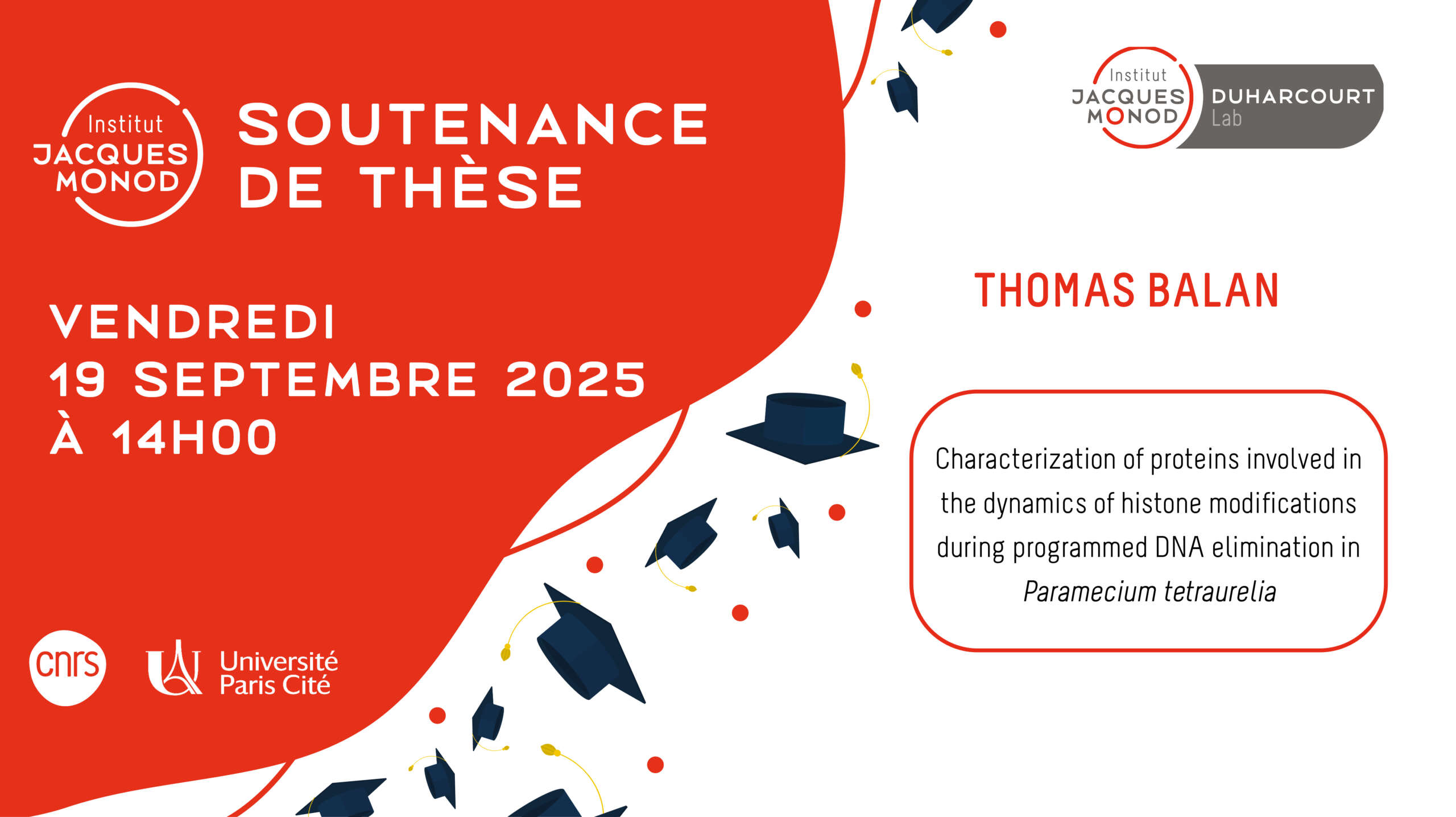
- Olivia Charmant 2019 – 2023 – fellowships from Université Paris Cité, FRM
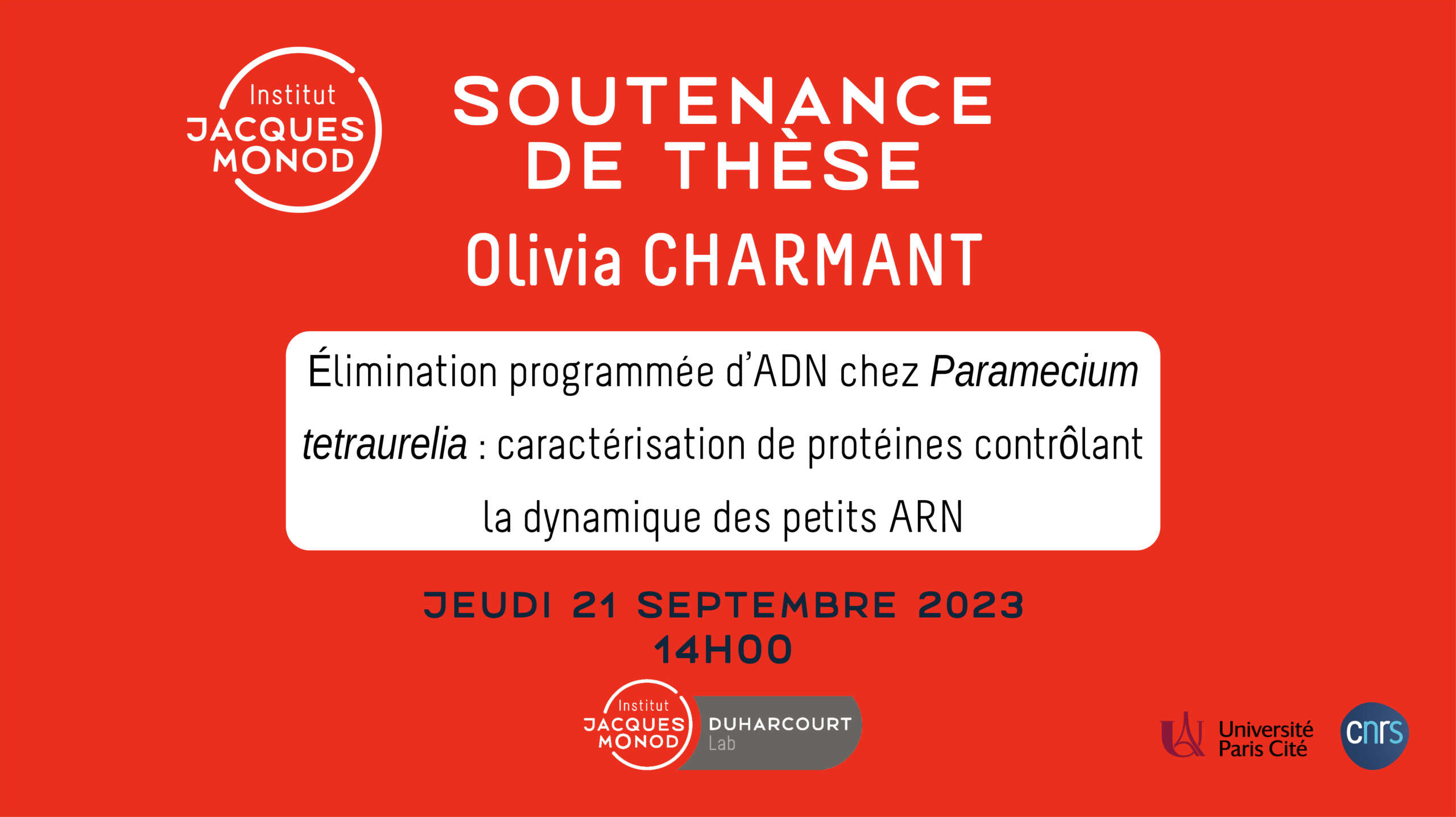
- Caridad Miro-Pina 2016-2020- fellowships from Université Paris Cité and Fondation ARC
- Amandine Touzeau 2014-2018 – fellowships from Université Paris Cité and Fondation ARC
- Andrea Frapporti 2012-2016 – fellowships from Université Paris Cité and FRM
- Maoussi Lhuillier-Akakpo 2010-2014 fellowships from Sorbonne Université and FRM
- Raphaël Margueron (Institut Curie, Paris, France)
- Olivier Arnaiz (I2BC, Gif, France)
- Slimane Ait-Si-Ali (EDC, Universite Paris Cité, France)
- Eric Meyer (IBENS, Paris, France)
- Laurent Duret (LBBE, Lyon, France)
- Mireille Bétermier (I2BC, Gif, France)
- Chunlong Chen (Institut Curie, Paris, France)
- Hadi Quesneville (INRA, Versailles, France)
- Karine Labadie/ Jean-Marc Aury (Génoscope, Evry, France)
- Thomas Berendonk (TU, Dresden, Germany)
- Ewa Przybòs/Natalia Sawka (ISEA PAS, Krakow, Poland)
- Alexey Potekhin (SPBU, St. Petersbourg, Russia)
- Matthieu Defrance (ULB, Brussels, Belgium)
- Julita Gruchota, Jacek Nowak (IBB, Varsaw, Poland)
- Till Bartke (Helmholtz Zentrum München, Germany)
- Benoit Palancade (IJM)
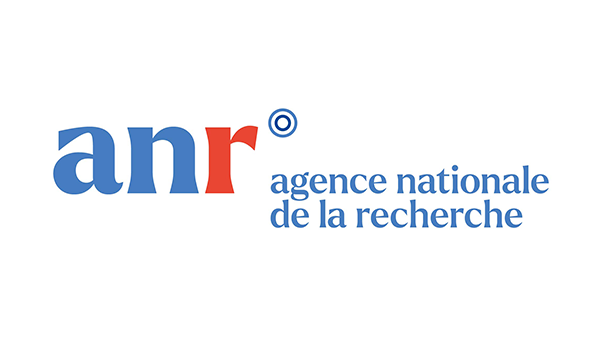
ANR LaMarque 2018-2022
ANR POLYCHROME 2019-2023
ANR SELECTION 2024-2026
ANR MODIFICATION 2026-2030
 LabEx Who Am I? 2021-2023
LabEx Who Am I? 2021-2023

Equipe labellisée FRM 2022-2026

04/07/2023 – Sandra Duharcourt, election as a member of the EMBO community
04/04/2022 – Sandra Duharcourt, CNRS Silver Medal


